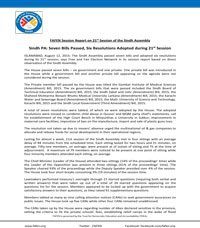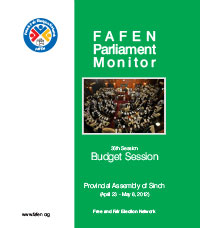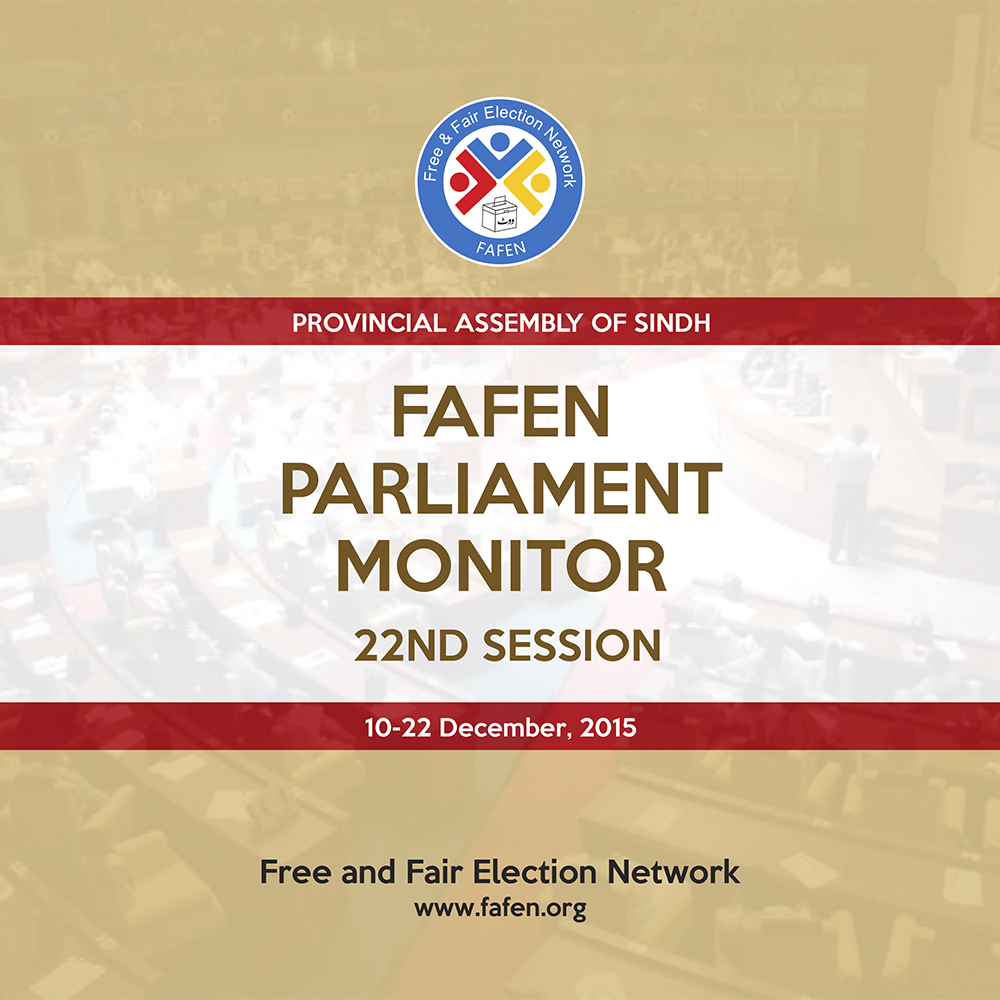ISLAMABAD, August 12, 2015: The Sindh Assembly passed seven bills and adopted six resolutions during its 21st session, says Free and Fair Election Network in its session report based on direct observation of the Sindh Assembly.
The House passed seven bills – six government and one private. One private bill was introduced in the House while a government bill and another private bill appearing on the agenda were not considered during the session.
The Private member bill passed by the House was titled the Gambat Institute of Medical Sciences (Amendment) Bill, 2015. The six government bills that were passed included the Sindh Board of Technical Education (Amendment) Bill, 2015; the Sindh Zakat and Ushr (Amendment) Bill, 2015; the Shaheed Mohtarma Benazir Bhutto Medical University Larkana (Amendment) Bill, 2015; the Karachi Water and Sewerage Board (Amendment) Bill, 2015; the Malir University of Science and Technology, Karachi Bill, 2015 and the Sindh Local Government (Third Amendment) Bill, 2015.
A total of seven resolutions were tabled, of which six were adopted by the House. The adopted resolutions were moved to condemn child abuse in Qusoor and MQM party chief’s statements; call for establishment of the High Court Bench in Mirpurkhas a University in Sukkur; improvement in maternal care facilities; imposition of ban on the manufacture, import and sale of plastic guns toys.
The resolution not taken up due to movers’ absence urged the multinational oil & gas companies to allocate and release funds for social development in their operational regions.
Lasting for almost a week, 21st session of the Sindh Assembly met in four sittings with an average delay of 84 minutes from the scheduled time. Each sitting lasted for two hours and 31 minutes, on average. Fifty-one members, on average, were present at of outset of sitting and 75 at the time of adjournment. A maximum of 79 members were noticed to be present at one point of sitting while four minority members attended each sitting, on average.
The Chief Minister (Leader of the House) attended two sittings (14% of the proceedings’ time) while the Leader of the Opposition was present in three sittings (41% of the proceedings’ time). The Speaker chaired 93% of the proceedings while the Deputy Speaker presided over 4% of the session. The House took four short breaks consuming 3% (19 minutes) of the session time.
Lawmakers performed treasury’s oversight through 21 starred questions (requiring both verbal and written answers) that were taken up out of a total of 24 starred questions appearing on the questions list for the session. Members appeared to be locked up with the government to acquire satisfactory answers to their questions, as they raised 91 supplementary questions.
Members tabled as many as nine calling attention notices (CANs) to seek government assurances on public issues. The House took up five CANs while other four CANs remained unaddressed.
The CANs taken up by the House were regarding number of dikes declared sensitive in the province, setting the criteria to fix the private schools’ fees, establishing relief camps in the wake of flood situation, the failure to convene the first ever meeting of Sindh Higher Education Commission, established after 18th amendment and non-operational Cardiology Ward at Government Pretabad Hospital Hyderabad.
Four other CANs appearing on the agenda were not taken up by the House due to movers’ absence. These CANs were related to removal of encroachment from nullahs in Karachi, absence of basic facilities at a government girl school in Hyderabad, Supreme Court’s order regarding officers working on Own Pay Scale (OPS) basis in various departments and shifting the slum residents to safe areas.
The House did not consider two privilege motions due to absence of movers. The first privilege motion submitted by PPPP female lawmaker was against Chief Municipal Officer TMA Mirpurkhas while another by PPPP lawmaker was against the disrespectful attitude of Deputy Commissioner, Malir.
The House took two Adjournment Motions (AMs) about load-shedding at water pumping stations in Karachi and failure of K-Electric but both were termed `out of order’ after being opposed by relevant ministers. A female lawmaker from MQM withdrew her AM regarding removal of encroachments from flood drainages following government assurance to resolve the issue while another AM about Jirga in Daherki, district Ghotki was not taken up due to mover’s absence.
The House witnessed presentation of 1st Biannual Monitoring on the Implementation of National Finance Commission (NFC) Award for the Period from July-December, 2013. Members raised 23 Points of Order, consuming 6% (34 minutes) of total session time while nine amendments in Rules of Procedure of the Provincial Assembly of Sindh appearing on third sitting’s agenda were not considered.
Three private motions about action against the land grabbers, growing trees in the province to control pollution and increase in rape incidents with innocent children were not taken up. Similarly, two identical private motions to construct ramps in every commercial building and hospitals for the disabled and aged persons also remained unaddressed.
The session witnessed four protests. During the first sitting, MQM members protested within the House for four minutes over the adopted resolution against MQM’s Chief statement. In the 2nd sitting, MQM members protested twice within the House for 13 minutes over alleged target killing of one of their party worker.
Likewise, PPPP lawmakers protested for nearly a minute in 2nd sitting when a female MQM lawmaker attempted to read a resolution against PPPP co-chairperson.
To download the session report, click here
The Session Report is based on direct observation of Sindh Assembly proceedings conducted by Pakistan Press Foundation (PPF), a member organization of FAFEN




